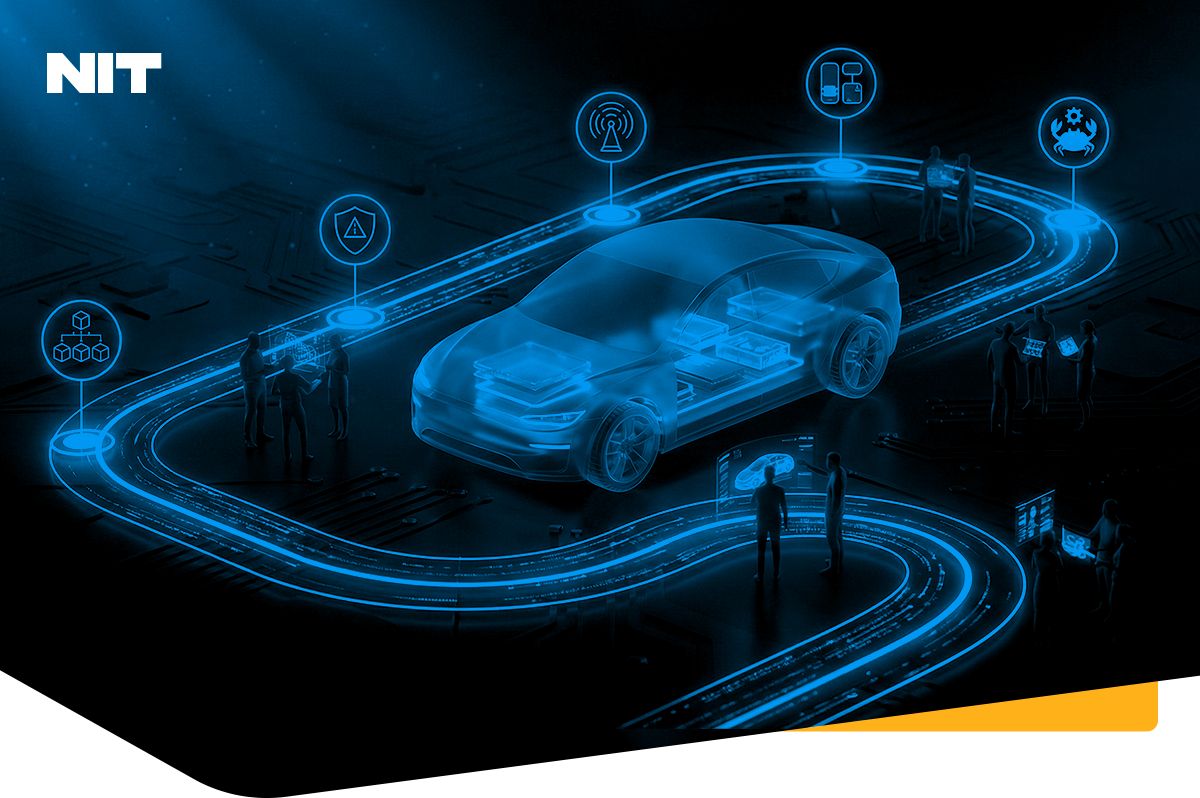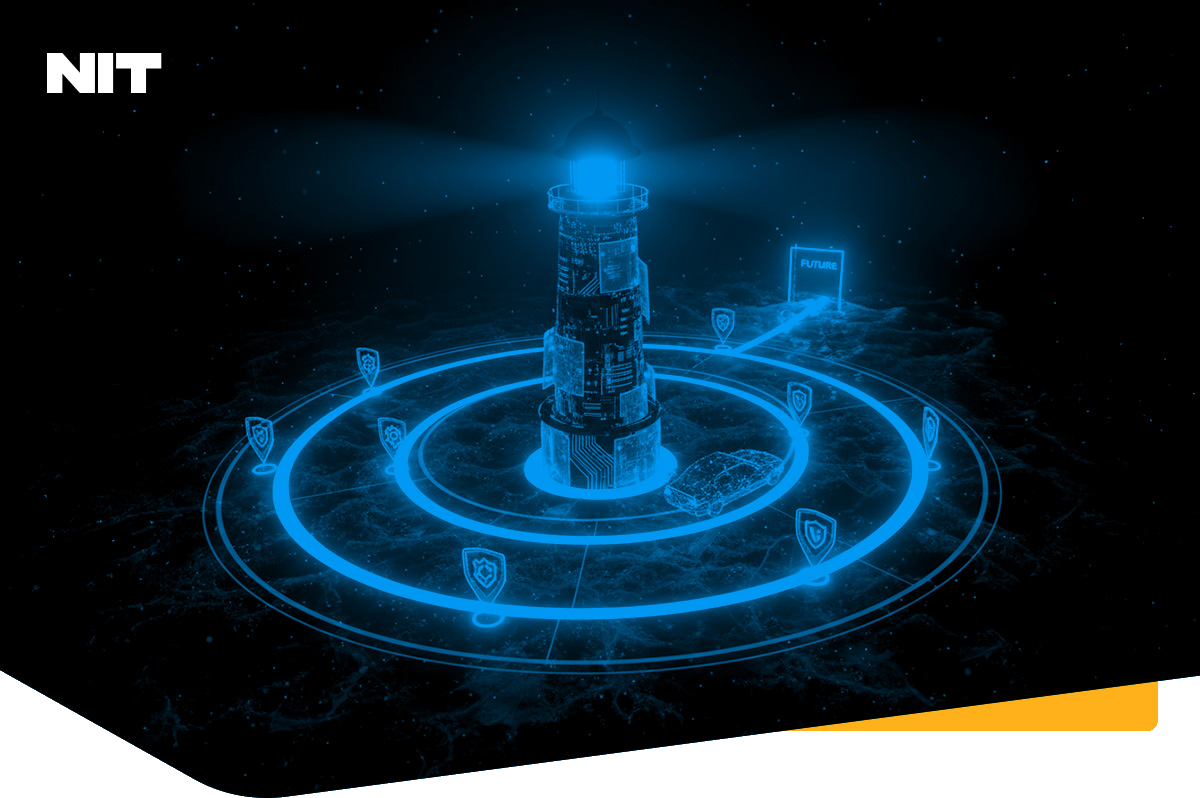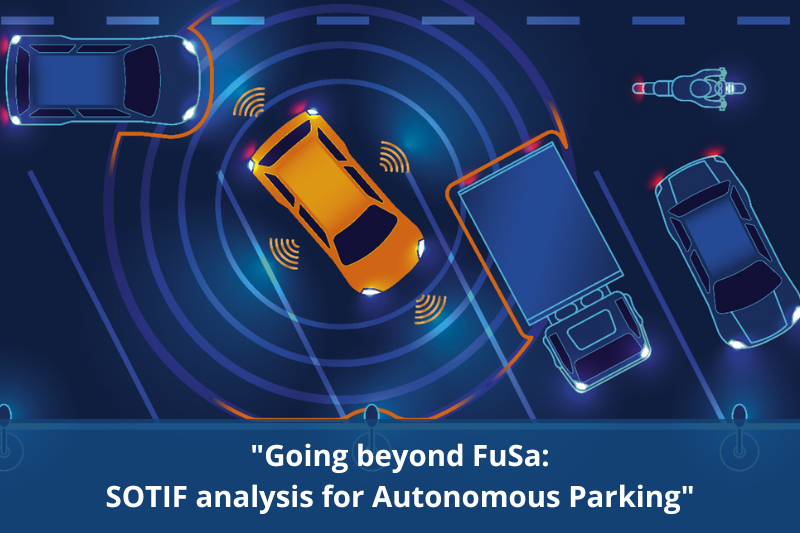
Innovation only makes sense when it creates impact. That’s why at NIT Institute we don’t just talk about technology - we connect people, projects, and knowledge to make it work in practice. From ZINC 2025, where researchers and companies meet to shape tomorrow’s consumer technologies, to AIOLIA, a Horizon Europe initiative turning AI ethics into actionable tools, and NIT Academy programs that train professionals in safety, software, and emerging tech - our work has one clear direction: building solutions that keep businesses and people ready for the future.
ZINC 2025: A decade of connecting ideas, people, and technology
For the past ten years, ZINC - Zooming Innovation in Consumer Technologies, has been more than a scientific research conference. It has been a platform built to connect researchers with companies and universities, creating an environment where groundbreaking ideas move from concept to real-world results. Proudly tied to the IEEE Consumer Technology Society, ZINC ensures that all accepted papers are published in the IEEE Xplore database, giving innovations a global reach.
This May, ZINC marked its 10th anniversary in Novi Sad, the “Serbian Athens,” under the theme Living with Tech. Hosted at the Sheraton Hotel, the program brought together a unique mix of research presentations, panels, workshops, demos, industry talks, and networking opportunities - especially valuable for young researchers and project teams eager to showcase their work.
The conference opened with an inspiring keynote from Prof. Dr. Fabrice Labeau, President of the IEEE Consumer Technology Society, who explored how signal processing continues to shape innovation on a global scale. Next up, Marko Anastasov shared why industries rooted in legacy systems must embrace DevOps and CI/CD practices to accelerate development, while Dr. Bogdan Pavković, CTO of NIT Institut and Adjunct Professor at UC San Diego, highlighted the challenges and opportunities of Functional Safety and SOTIF in the era of software-defined vehicles, illustrating his talk with concrete automotive case studies. Together, these sessions - along with panels, workshops, demos, and networking - created an environment where young researchers and seasoned experts could meet as equals, exchange perspectives, and start new collaborations.
In numbers, the 2025 edition of ZINC confirmed both its global reach and its resilience. Over two days, the conference gathered participants from 11 countries across three continents, including Serbia, Croatia, Germany, the UK, China, India, Sweden, and South Africa. A total of 36 papers were presented across nine thematic sessions, complemented by three keynotes that addressed the future of DevOps, the impact of AI on human cognition, and trust in using generative AI tools. Despite social and academic challenges in Serbia at the time, the event successfully combined in-person and remote formats, maintaining its high quality and international spirit. This continuity underlines why ZINC, even after a decade, remains a vital meeting point for researchers, engineers, and industry leaders.
AIOLIA: Practical tools for responsible AI
AIOLIA is a Horizon Europe initiative (2025–2028) focused on closing the gap between AI ethics principles and real-world application in engineering, education, and policy. While frameworks like the EU AI Act and UNESCO recommendations define what ethical AI should be, AIOLIA delivers the how - turning abstract guidelines into actionable, context-specific tools.
At NIT Institut, we focus on how AI can make safety analysis in the automotive industry more effective. In simple terms, safety analysis is the process engineers use to detect and prevent risks in complex systems — for instance, ensuring that vehicle software cannot trigger unsafe actions by mistake. As part of AIOLIA, we are using a tool to evaluate the ethical aspect of engineers using AI for conducting a SOTIF analysis by using our tool that we developed to automate step 3 and step 4 of the process. This tool uses large language models to support this process, helping engineers more quickly identify potential unsafe actions and the reasons behind them.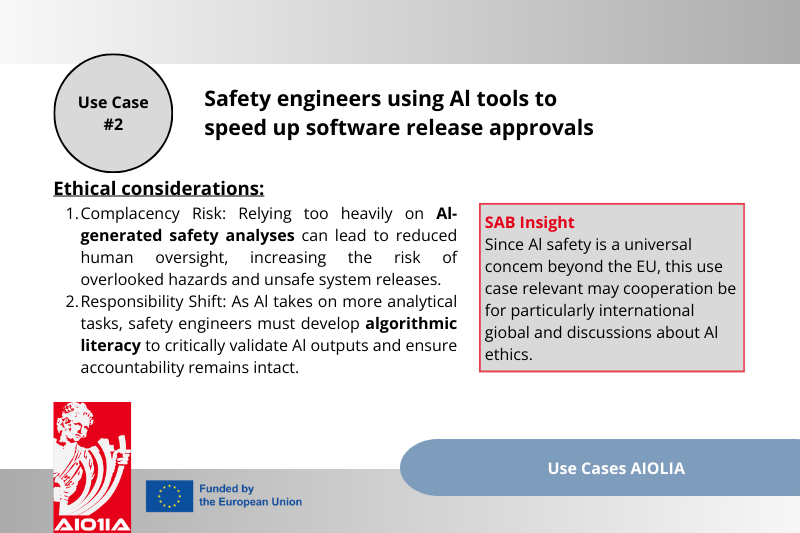
The tool is designed to assist engineers, not replace engineers - simplifying the most complex and repetitive tasks while keeping experts in full control of the process. We emphasized practicality and user-friendliness, making it suitable for real-world engineering workflows.
Earlier this year, we tested this approach through a live demo session with 17 safety experts from both industry and academia. The goal was not only to show how the tool works on real automotive safety examples, but also to explore its risks - particularly automation complacency, the tendency to trust AI-generated results without sufficient verification. Our next step will be observing how experts interacted with the tool while we evaluate whether they would still perform the necessary cross-checks before accepting automated outputs.
The session encouraged valuable discussion about both the potential and limitations of AI in safety-critical environments, confirming the importance of combining efficiency with responsibility. Based on the feedback, we are now refining and improving the tool, preparing it for broader experimentation and future use.
This hands-on work reflects AIOLIA’s mission: embedding ethics-by-design into practical tools that make AI safer, more transparent, and more useful for engineers worldwide.
NITUP 2025: Turning Knowledge into Practice
Our first NITUP of 2025 took place on March 19 at the Science and Technology Park Novi Sad, bringing together professionals and enthusiasts eager to explore new approaches to safety in embedded systems.
Samir Sarkic, Chief Safety Expert with experience at Siemens, Bosch, ZF-TRW, and Vector Consulting, led the session. His talk, “Faster Safety Map”, addressed one of the toughest challenges in embedded systems: while Agile and DevOps speed up development, safety releases still remain a bottleneck.
Samir presented actionable solutions for enabling faster and safer releases, demonstrated Safety Automation Skills in a live demo, and engaged the audience in an open discussion that sparked valuable exchanges and practical insights.
Looking ahead, our next NITUP session is set for September 17, 2025, at 6 PM in Prostor wher our guest, Dr. Nenad Četić, will speak on the topic “AI in Mission-Critical Engineering: Lessons from a Revolution in Progress.”
The session will dive into how AI is transforming mission-critical domains - from government technology and automotive to robotics and healthcare. It will show how AI can be embedded into requirements, diagnostics, compliance, and knowledge management to drive breakthroughs without sacrificing rigor or trust. Attendees will take away practical insights on how to automate, augment, accelerate, and assure engineering where reliability is non-negotiable.
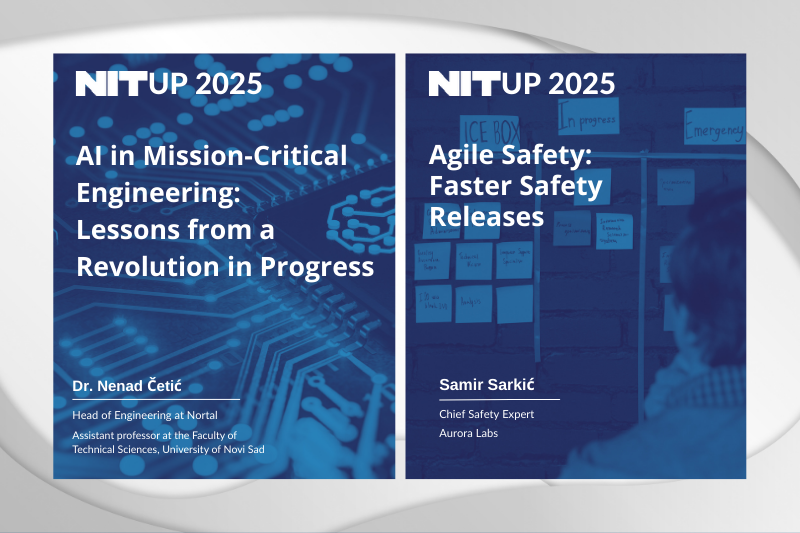 Follow us on LinkedIn to stay updated.
Follow us on LinkedIn to stay updated.
Build your knowledge with NIT Academy courses
Enrollment is now open for all NIT Academy programs. Our portfolio is designed to address the critical challenges of the automotive industry as it shifts to a software-first approach. With software-defined vehicles becoming reality, new tools, standards, and risks are reshaping the way engineers work. Today, safety and cybersecurity stand out as the most critical areas where continuous learning is essential.
To help professionals stay ahead, we offer courses that cover both core engineering skills and emerging domains:
- Software Development with TDD and BDD
- Programming with Rust
- AI Safety for Automotive
- Introduction to Software-Defined Vehicles
- DevOps with CI/CD for Edge
- Automotive Cybersecurity Fundamentals
- Automotive Safety Standards with ISO 21488 (SOTIF)
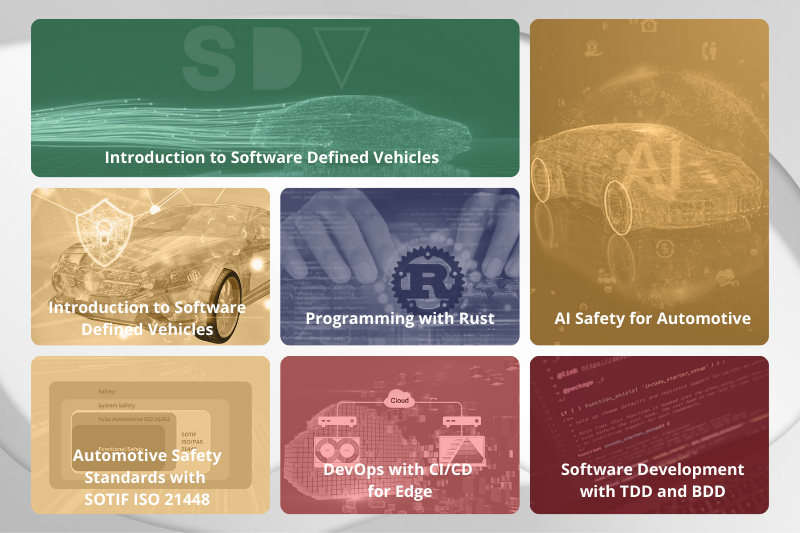 The pace of change - from new safety standards to cybersecurity requirements - demands structured learning paths. Our Culture Transformation and Key Areas (CTKA) upskill helps teams adapt through tailored combinations of courses, tested in practice with Tier 1 and Tier 2 suppliers.
The pace of change - from new safety standards to cybersecurity requirements - demands structured learning paths. Our Culture Transformation and Key Areas (CTKA) upskill helps teams adapt through tailored combinations of courses, tested in practice with Tier 1 and Tier 2 suppliers.
Whether your goal is personal growth or team-wide transformation, NIT Academy offers flexible options - from individual courses to comprehensive learning programs.
See all open courses at academy.nit-institute.com/courses and subscribe to our newsletter to stay informed on all topics regarding our work.

